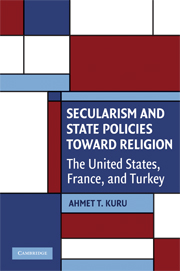Book contents
- Frontmatter
- Contents
- List of Figures and Tables
- Glossary of Abbreviations
- Acknowledgments
- Secularism and State Policies toward Religion
- Introduction
- 1 Analyzing Secularism
- PART I THE UNITED STATES
- 2 Passive Secularism and the Christian Right's Challenge (1981–2008)
- 3 Religious Diversity and the Evolution of Passive Secularism (1776–1981)
- PART II FRANCE
- PART III TURKEY
- Conclusion
- Appendix A State-Religion Regimes Index of 197 Countries
- Appendix B Human Development and Official Religion in 176 Countries
- Appendix C State-Religion Regimes in Forty-Six Muslim Countries
- Appendix D Turkey's National Security Council Decisions, February 28, 1997
- Bibliography
- Index
2 - Passive Secularism and the Christian Right's Challenge (1981–2008)
Published online by Cambridge University Press: 05 June 2012
- Frontmatter
- Contents
- List of Figures and Tables
- Glossary of Abbreviations
- Acknowledgments
- Secularism and State Policies toward Religion
- Introduction
- 1 Analyzing Secularism
- PART I THE UNITED STATES
- 2 Passive Secularism and the Christian Right's Challenge (1981–2008)
- 3 Religious Diversity and the Evolution of Passive Secularism (1776–1981)
- PART II FRANCE
- PART III TURKEY
- Conclusion
- Appendix A State-Religion Regimes Index of 197 Countries
- Appendix B Human Development and Official Religion in 176 Countries
- Appendix C State-Religion Regimes in Forty-Six Muslim Countries
- Appendix D Turkey's National Security Council Decisions, February 28, 1997
- Bibliography
- Index
Summary
During the presidential campaign in August 1980, the Republican presidential nominee, Ronald Reagan (1911–2004), unlike his rival Jimmy Carter, accepted an invitation to address evangelical Christians in Dallas. To the audience of “10,000 conservative Christians, including 2,500 pastors,” Reagan said, “I know this group can't endorse me, but I want you to know that I endorse you and what you are doing.” That event was an important step forward in Reagan's alliance with the Christian Right led by evangelical leaders, such as Jerry Falwell and Pat Robertson. The Christian Right was based on a decade-long activism as a reaction to several court decisions on issues such as the prohibition of Bible reading and organized prayer in schools, the legalization of abortion, and the removal of tax-exempt status of schools that practiced racial discrimination.
Reagan's presidential inauguration in 1981 meant the beginning of a new era in state-religion relations in the United States. The conservatives, in general, and the Christian Right, in particular, gained a powerful ally at the White House, though some of them would later be disappointed by Reagan's lack of sufficient support for school prayer amendments and appointment of moderate conservative Sandra Day O'Connor to the Supreme Court. Reagan's presidency consolidated the alliance between the Christian Right and the Republican Party.
- Type
- Chapter
- Information
- Secularism and State Policies toward ReligionThe United States, France, and Turkey, pp. 41 - 73Publisher: Cambridge University PressPrint publication year: 2009

